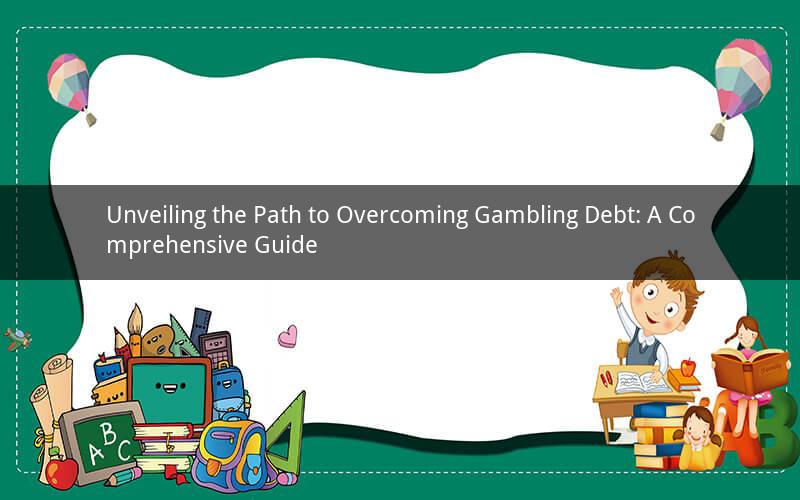
Introduction:
Gambling debt is a prevalent issue that affects individuals from all walks of life. Whether it's due to the allure of winning big or the thrill of taking risks, many find themselves ensnared in a web of debt. This article delves into the various aspects of gambling debt, providing valuable insights on how to overcome it. From understanding the causes to seeking professional help, we explore the steps one can take to regain control over their finances and rebuild their lives.
1. Understanding the Causes of Gambling Debt:
a. The allure of winning big: The prospect of winning a substantial amount of money can be irresistible, leading individuals to take on excessive debt in pursuit of this goal.
b. Emotional triggers: Stress, anxiety, and other emotional factors can drive individuals to gamble, often resulting in uncontrollable spending and accumulating debt.
c. Lack of financial literacy: A lack of understanding of personal finances and the consequences of gambling can contribute to the development of gambling debt.
d. Peer pressure and societal influence: The influence of friends, family, or societal norms can push individuals towards gambling, often leading to debt.
2. Recognizing the Signs of Gambling Debt:
a. Unpaid bills and mounting debts: If you find yourself struggling to pay bills and accumulating debt, it may be a sign of gambling addiction.
b. Secretive behavior: Hiding gambling activities and avoiding discussing financial issues with loved ones can indicate a problem.
c. Emotional distress: Feelings of guilt, anxiety, and depression often accompany gambling debt, impacting one's mental well-being.
d. Relationship problems: Gambling debt can strain relationships, leading to conflicts and a breakdown in communication.
3. Taking Control of Your Finances:
a. Acceptance: Acknowledge that you have a gambling debt problem and are committed to overcoming it.
b. Create a budget: Track your income and expenses to gain a clear understanding of your financial situation. Allocate funds for essential expenses and prioritize debt repayment.
c. Cut off funding sources: Stop using credit cards or any other means of financing your gambling habits. Seek support from friends or family to monitor your spending.
d. Seek professional help: Consider seeking the assistance of a financial advisor or counselor to develop a tailored plan for debt repayment.
4. Overcoming Emotional Triggers:
a. Identify triggers: Reflect on what prompts your gambling urge and develop strategies to cope with these triggers.
b. Replace negative habits: Engage in healthy activities that can replace the desire to gamble, such as exercise, hobbies, or socializing.
c. Seek support: Surround yourself with a supportive network of friends, family, or support groups who can provide encouragement and guidance.
d. Professional therapy: Consider seeking therapy to address underlying emotional issues that may contribute to your gambling addiction.
5. Legal and Financial Solutions:
a. Debt consolidation: Consider consolidating your debts into a single, manageable payment. This can simplify the repayment process and reduce interest rates.
b. Negotiating with creditors: Reach out to your creditors and negotiate more favorable repayment terms, such as reduced interest rates or extended payment plans.
c. Bankruptcy: In extreme cases, bankruptcy may be an option to discharge your gambling debt. However, it is crucial to consult with a legal professional before considering this route.
d. Credit counseling: Seek the assistance of a credit counselor who can provide guidance on managing your debt and developing a long-term financial plan.
Conclusion:
Overcoming gambling debt is a challenging journey, but it is possible with determination and the right approach. By understanding the causes, recognizing the signs, taking control of your finances, overcoming emotional triggers, and seeking legal and financial solutions, you can regain control over your life and move towards a debt-free future.
Questions and Answers:
1. How can I identify if I have a gambling problem?
You may have a gambling problem if you find yourself struggling to control your gambling habits, accumulating debt, experiencing emotional distress, or neglecting important responsibilities.
2. Can I overcome gambling debt on my own?
While it is possible to overcome gambling debt independently, seeking professional help can provide additional support and guidance. Consider seeking assistance from financial advisors, counselors, or support groups.
3. Will my gambling debt affect my credit score?
Yes, gambling debt can negatively impact your credit score. It is crucial to address your debt promptly to minimize its impact on your financial future.
4. Can I negotiate with my creditors to reduce my gambling debt?
Yes, you can negotiate with your creditors to find more favorable repayment terms. However, it is advisable to seek professional assistance to ensure you secure the best possible outcome.
5. Is bankruptcy a viable option for gambling debt?
Bankruptcy can be a viable option for extreme cases of gambling debt. However, it is crucial to consult with a legal professional to understand the potential consequences and explore other alternatives before considering bankruptcy.